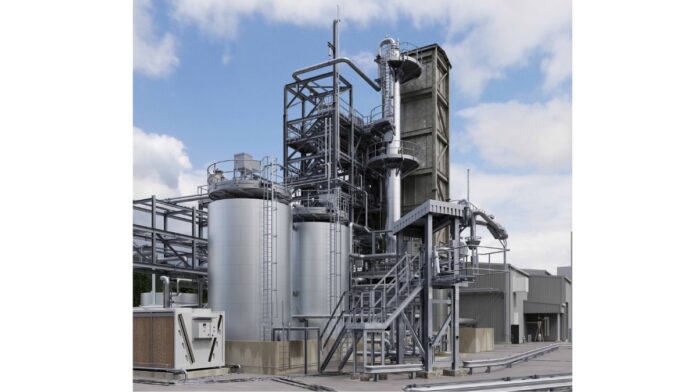Mura Technology has today opened the world’s first commercial-scale HydroPRS™ advanced plastic recycling plant in Teesside, UK, to key representatives from the advanced recycling and plastic manufacturing value chains. The event marks the beginning of commissioning, with the first recycled hydrocarbon products expected to be delivered to Mura’s offtake partners in early 2024.
Key figures from the plastics industry in attendance included Marco ten Bruggencate, Dow’s Commercial VP for EMEA and the President of industry body Plastics Europe, Benny Mermans, Vice President of Sustainability at Chevron Phillips Chemical (CPChem) and Jinsuk Kim, Managing Director of LG Chem Europe. Doug Kelly, President of Technology at KBR, Mura’s License and Engineering Partner, also attended, alongside Dr Paul Davidson, Director of UK Research & Innovation’s Smart Sustainable Plastic Packaging Challenge, delivered by Innovate UK.
The purpose-built facility at the Wilton International industrial site will process flexible and rigid mixed plastics, including films, that are currently considered ‘unrecyclable’.
The HydroPRS™ process complements mechanical recycling and enables a circular plastics economy through the production of recycled plastic feedstock for the manufacture of new plastic.
The site has capacity to produce 20ktpa of recycled liquid hydrocarbon products, with scope to expand production capacity to over three times this initial size. Located at Wilton International, Teesside, the site will provide up to 50 direct jobs, having created approximately 150 jobs during the build and commissioning phases, and approximately 100 further jobs2 within related infrastructure to support operations.
Dr Steve Mahon, Mura Technology’s CEO, said: “Today’s pre-commissioning open day of our first-of-its-kind, next generation recycling facility is a groundbreaking achievement and the culmination of four years of dedication.
Our HydroPRSTM process is unlocking a new market for plastic waste, creating value and keeping both plastic and carbon in circularity. The technology works alongside existing mechanical recycling to ensure no plastic types are considered ‘unrecyclable’ and require incineration or landfilling.
With support from our partners, the Teesside site will be the first in Mura’s global roll-out, helping in the fight against the plastic pollution and global warming crises and acting as a launchpad for the 1,000,000 tonnes of annual recycling capacity that Mura plans to have in operation and development in this decade.”
Pioneered by Mura Technology, the HydroPRS™ process, unlike pyrolysis, utilises supercritical water (water under high pressure and high temperature) to convert post-consumer, multi layered, flexible and rigid plastics such as films, pots, tubs and trays, which are largely considered ‘unrecyclable’ through other methods, into high yields of stable, premium hydrocarbon feedstocks. Through this process, there is no limit to the number of times the same material can be recycled – meaning HydroPRS™ has the potential to significantly reduce single-use plastics and permanently increase material circularity in the plastics industry. By providing a route to recycling for these materials, Mura is creating a complementary process to sit alongside traditional mechanical recycling, as highlighted in a recent technical report by the European Commission’s Joint Research Centre (JRC).
Use of plastic, particularly in single-use packaging, has overwhelmed recycling and waste systems globally. Recycling rates for plastic packaging vary globally with the UK at 50% and the US at only 13%.
Poor waste management has led to plastic entering our environment. Durability means plastic remains in our rivers and seas for years, slowly breaking up into microplastics. The harmful impacts of plastic pollution on both human health and marine life are only just starting to be understood.
Independent Life Cycle Assessments (LCAs) based on the first site at Teesside have shown the HydroPRS™ process provides an 80% carbon emissions saving by diverting ‘unrecyclable’ plastic away from incineration.6 When compared to fossil oil-based feedstock, HydroPRS™ produces products with an equivalent or lower Global Warming Potential and saves up to five barrels of oil for every tonne of plastic waste processed.
Mura has been supported by investment from blue-chip companies across the plastic recycling value chain including KBR, Dow, CPChem, LG Chem and igus GmbH, alongside funding from UK Research & Innovation’s Smart Sustainable Plastic Packaging Challenge and the Government’s Future Fund. These partnerships have enabled Mura to begin scaling worldwide, with plans in development for sites in the USA and at Dow’s Böhlen site in Germany. Alongside these investments, the company has secured partnerships with Mitsubishi Chemical Corporation, LG Chem and GS Caltex Corporation for the development of HydroPRSTM facilities under licence in Japan and South Korea.












